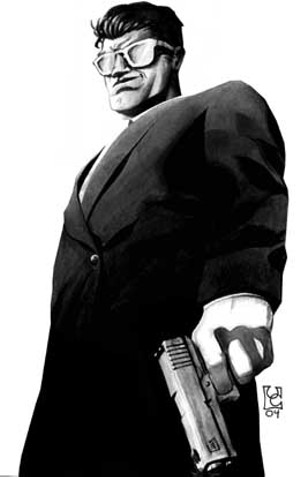G. I. Jihadi

Ulises Carpintero
Mr. Fifty from "Black Heart Irregulars"
The comics industry has been uncharacteristically shy with the war in Iraq. Oh, it’s flirted with her a little: talked about her in a vague, general way, cast sidelong looks at her, alluded to her, but nothing more serious.
The Justice League, for example, spent some time in space weighing the morality of preemptive war on the alien planet of “Kylaq,” then a few months later the evil American president/supervillain Lex Luthor announced his intention to preemptively invade the sovereign foreign nation “Qurac” using shaky intelligence—in a bad dream of Superman’s.
Meanwhile, Marvel Comics’ premiere super-team, The Ultimates, have been conducting military action against an unnamed Middle Eastern power, one that seems to be a mixture of Iran and Iraq.
While the most-read, major, mainstream comic companies dance around the war, seemingly wanting to comment on it without offending half their readership, no comic book writers have stormed right up to her, grabbed her by the waist and asked her to dance yet. At least, not until the first issue of writer Neil Hendrick’s The Black Heart Irregulars dropped.
This new ongoing series comes from indie publisher Blue King, and like in any other media, the smaller the business, the greater the risks they can afford to take with their material, as they don’t have to worry about powerful corporate advertisers indirectly dictating their content.
Black Heart Irregulars is set in the Green Zone of Baghdad in the near future, after the western culture of the conquerors has started to take a slight hold on the conquered. This is perhaps because Hendrick had a very specific sort of city and political climate he wanted to set his tale in, or perhaps simply because it would be impossible to set a monthly comic in a city that could change so drastically between issues.
The book stars the former members of the private security firm Black Heart Security Inc., who were hired by a diplomat to escort him safely into the American embassy for a meeting. That diplomat turned out to be a suicide bomber, however, and used them to help get access to an especially hard to blow-up target. Disgraced and distrusted by all parties in Iraq, these former independent contractors and (before that) former soldiers decide to become freelance international terrorists, specializing in terrorizing the terrorists.
That’s right, the good guys are the terrorists here, a concept that’s always been a bit foreign to comics (Alan Moore and David Lloyd’s 20-year-old V For Vendetta graphic novel aside), but sounds downright apostatic post-9/11.
It’s a fact Hendrick exploits for the first of many whiplash reversals in issue one, where the leader of the re-christened Black Heart Irregulars, Mr. Fifty (named after both the machine gun caliber he specialized in and the decade of American pop culture his Baghdad coffee shop/front celebrates), recruits a cell of his own Islamic jihadis, telling them “Al Qaeda is a pyramid scheme, and I’m opening up a franchise,” right before he seemingly bombs the set of an American reality TV show.
“You think 9/11 was frightening to Americans?” a smug Arab thug responds to the footage, “Nothing is more frightening than this, taking away the safety of the electronic tit that the west suckles on.” Ouch.
The recruits are really just pawns in an elaborate game Mr. Fifty is setting up, as he and his Irregulars seek revenge on the bad terrorists who used them in the embassy attack and turned them into the good terrorists.
In the first issue, it seems as if Hendrick is merely setting up a slam-bang action book, fearlessly (maybe even recklessly) injecting it with a refreshingly real world relevance. Mr. Fifty is surrounded by terrorists, U.S. spies and someone watching him through a sniper rifle, and it looks as if the book can still go many ways, with the only bankable prediction being that it’s going to look good going there—Argentinean artist Ulises Carpintero’s bold, noir-ish artwork, all clean black and white contrasts, is so punchy it will bruise your eyes.
But by the second issue, expected in comic shops in late September, it becomes clear that not only does this comic book have a big set of brass balls, but it’s also got a surprisingly level head on its shoulders.
While the Bushie-baiting gets cranked up from a respectable six to an 11 (When the Irregulars are tossed in Abu Ghraib after the embassy bombing, one of them defiantly rails, “You call this a military prison? Call in the dogs! I got nuts here with no dog on ‘em!”), so does the apparent point of the book.
We learn that shortly after the bombing, one of the Irregulars decided to fight fire with fire, launching a mad plan to hijack a plane out of Iraq and fly into Mecca. Mr. Fifty talks him out of it: “Do you shoot the pope because Irishmen bomb a bus in London?… I tell you, these bastards would piss champagne if you stirred up the hate of the world” by attacking a Muslim religious site.
Later on, a mysterious espionage sort lays out the so-called “War on Terror” to Mr. Fifty:
“When we talk about terrorism, we aren’t talking about terrorism. Irish and Basque separatists, Japanese Armageddon cults, they are using terrorism, using the methods, but they are not part of this war. What we are talking about is Wahaabism.
“Muslims yes, but as close to popular Islam as the Ku Klux Klan is to Protestants… We know who the monsters are in this horror movie, but it’s the villagers we are chasing around with torches and pitchforks.”
That little speech apparently becomes the bulk of the newly formed Black Heart Irregulars’ mission statement. Unable to fight the highly decentralized members of Al Qaeda itself—like, um, the United States military—they decide to strike at their support network, chartering a plane, recruiting a Wahaabi fanatic jihadi to fly it for them, and having him slam it into a an offshore oil rig: “For the Saudis,” Fifty explains, “This one was a kick in the nuts.”
A cogent analysis of the nature of the enemy in the terror war, followed by a cathartic attack on “the monsters” instead of “the villagers”—it’s a graceful one-two punch of wish fulfillment.
It’s either great news for the current state of the medium of comic books, or terrible news for the current state of our country’s leadership, that the former speaks more eloquently, articulately and truthfully about a complicated but dire political situation than the latter. I suspect it’s actually a little of both.



